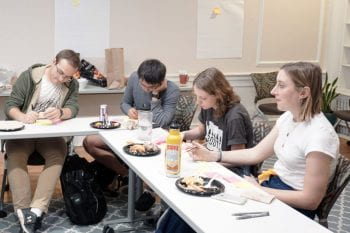
One of the central, guiding goals of the Gephardt Institute is to “infuse civic engagement throughout the Washington University experience.” Lifelong civic engagement is a process that happens as students progress through their education, and the institute seeks to provide support at each juncture in students’ civic development. In addition to offering a broad introduction to civic and community engagement through programs like Engage STL, the institute seeks to support student leaders across campus who are already engaging with community in large and small ways.
Events and trainings like the recent Community Service Roundtable provide an opportunity for student leaders from a variety of backgrounds and interests to join together to share ideas, celebrate successes, problem-solve, and strategize. The roundtable, led by staff members Colleen Smyth and Mike Jones with student staff member Karina Carcamo, was designed to build community among leaders from a wide variety of community-facing student groups. Colleen Smyth, Student Engagement Coordinator, described the roundtable as a “space to bring people together and offer the Gephardt Institute as a resource for follow-up conversations.”
Karina Carcamo, class of 2020, Student Engagement and Outreach Coordinator, presented an overview of the Gephardt Institute and its resources for students. As she detailed the variety of ways to get involved both within and outside of the institute, Karina emphasized that “civic engagement can look different for everyone.” Certainly, the student leaders in the room represented a varied slice of those many avenues for engagement. Attendees represented the Blood Drive Leadership Team, the Roosevelt Network, WU/FUSED (Washington University for Undergraduate Socioeconomic Diversity), Design for America, Campus Y, Engineers Without Borders, WU Adopt a Grandparent, and Create Circles.
The participants found, however, that their groups shared more in common than might be immediately apparent and that their differences proved valuable in providing new perspectives on issues. Harsh Moolani, class of 2020, founder of Create Circles, a nonprofit organization seeking to connect students and older adults to work together on creative projects, shared, “Sometimes we get so involved in our own area of focus that it’s hard to zoom out and see the bigger picture. Engaging with other leaders can help to see things more holistically.”
The facilitators offered the opportunity for attendees to think about strengths, weaknesses, challenges, and opportunities within their groups before highlighting common responses and brainstorming ways to face challenges, bolster weaknesses, utilize strengths, and take advantage of opportunities. Participants brought up both general and specific issues that they were struggling with, and the group discussed possible solutions together, drawing on their own experiences. Leaders from older, more established groups shared methods for effective organization and member retention, while newer groups shared tips for sparking passion and enthusiasm among students. Mike Jones, Student Engagement Manager, encouraged the leaders to think about ways that their strengths could help to alleviate challenges for other groups and vice versa.
For the final activity, students from different groups were paired to discuss the questions, “When you joined your student group, why did you join? How are you practicing self-care as a group? What practices are you doing to build community identity?” Many participants shared that they joined their groups out of a dedication to a larger purpose. Mike emphasized the importance of taking time to “reinvigorate the sense of mission” within groups and maintain passion and purpose in the midst of the logistical and administrative challenges of leadership.
Kyle Nicholson, class of 2020, represented Engineers Without Borders, a student group working to promote innovation and service through engineering. He described the roundtable as an “opportunity to collaborate and look for solutions together.” The community service roundtable opened up avenues of communication between groups for the future, getting the conversation started. After the roundtable concluded, the student leaders continued to chat with each other all the way out the door, marking what will hopefully be the beginning of many fruitful collaborations.
The Gephardt Institute is a resource for student groups and student leaders on campus and in the community. In addition to trainings like this one, the institute offers Civic Engagement Fund grants, weekly drop-in hours, and more. Current students can connect with Colleen at colleen.smyth@wustl.edu or with Mike at mikejones@wustl.edu to learn more about the institute or to set up a meeting.